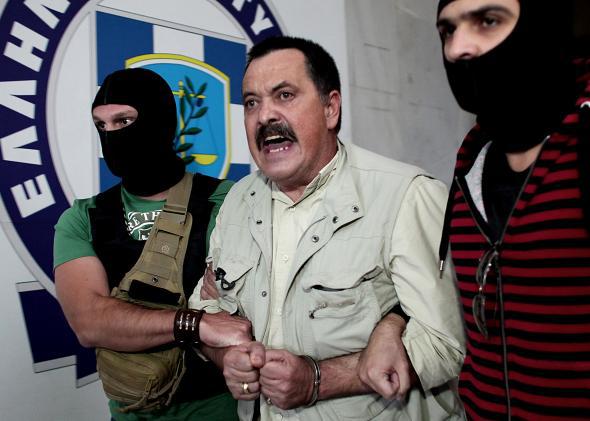Greek counterterrorism officers have arrested Nikos Michaloliakos, the leader of the country’s extremist Golden Dawn party, along with five other lawmakers , on charges of starting a criminal gang.
Since being elected last year in the wake of Greece’s economic collapse, the party, which has blamed the country’s problems on “Jewish bankers,” denied the Holocaust, and uses a symbol similar to a swastika as its logo, has been involved in several instances of thuggish behavior against other lawmakers while its supporters have been implicated in dozens of incidents of violence against immigrants, particularly those of South Asian and African descent.
Things came to a head earlier this month with the murder of the well-known anti-fascist activist and rapper Pavlos Fyssas, aka Killah P, by 10 men wearing black T-shirts and camouflage. A Golden Dawn member was arrested in connection with the murder and the party’s offices were raided. Golden Dawn has denied involvement in the murder. The party has also been accused of a range of other crimes including extortion and money laundering.
Still, the arrest of sitting lawmakers and what amounts to the wholesale criminalization of a party that earned 7 percent of the vote last year is an extreme step. As NPR’s Joanna Kakissis notes, this is the first time that sitting members of parliament have been arrested since the end of the country’s military dictatorship in 1974.
Gideon Rachman of the Financial Times is right that “Mass arrests of legitimately elected politicians should always spark unease.”
“When you feel you have to arrest your neo-Nazi party to limit their influence, things have gone far indeed in a very bad direction,” adds Tyler Cowen.
Recent history has also shown that prosecution is not a particularly effective way to limit the influence of extremist parties. A number of Dutch political observers believe that the hate speech prosecution of the anti-immigrant politician Geert Wilders increased his support among moderate voters, who believed that the authorities had gone too far, giving his party enough votes in the 2010 parliamentary election to become members of a right-wing minority government. Wilders has not fared as well since being acquitted.
Golden Dawn is obviously a step beyond other anti-immigrant parties in Europe, with its members guilty not just of inflammatory rhetoric but—allegedly—of violent criminal activity. The government believes, not without some justification, that the party is a legitimate threat to Greek democracy.
But if the criminal case tying Michaloliakos and his associates to the violence and criminal activity is anything short of a slam dunk, Golden Dawn’s supporters, and perhaps even some previously skeptical voters, may come to believe the party has been unfairly persecuted. Recent polls have shown support for the party falling, but as we’ve seen time and again in other countries, extremists love an opportunity for some high-profile martyrdom.
